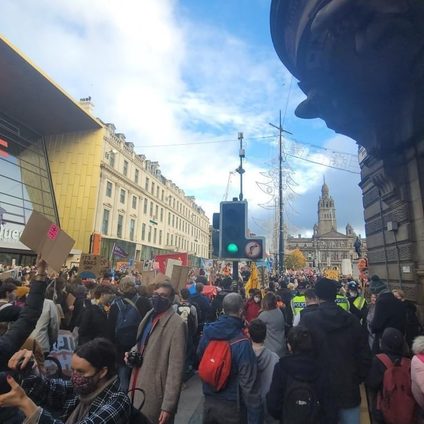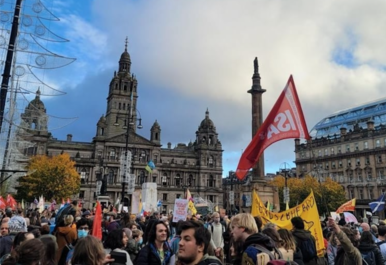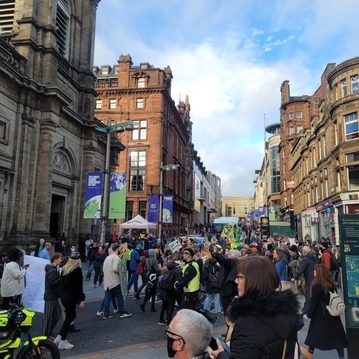
By Owen Leggatt Stewart (Nov 5, 2021)
After the first week, COP26 has presented some small steps forward for the environment. Forgive my pessimism, but I am not convinced it will be the solution to the broad environmental problems we face.
Before even beginning, the conference suffered from access issues.
BIPOC observers and delegates from developing nations are underrepresented at the event, despite being the most at risk to the effects of climate change and the least prepared to adapt to and mitigate its effects. The cost of accommodation in Glasgow is obscene, as hotels and Airbnb hosts tripled their prices in anticipation of the event, adding further obstacles for those attending on a budget.
Now that the conference is in full swing, other access issues remain.
30,000 badges have been granted to access the blue accredited zone, but the zone's capacity has been capped at 10,000. Venues reach capacity early in the day, and turnover is limited. Lines are long to access badges, tests or venues. Even non-accredited zones require tickets - with their capacity also slashed due to the pandemic. Virtual access is an alternative, but even then accessing the virtual platform has been problematic and does not replace in person engagement.
COP itself is exhausting.

The “end of the world” rhetoric is draining, and milquetoast solutions, presented as ambitious by world leaders, don’t exactly drive passion. The COP26 grounds are a maze, with thousands of delegates, diplomats, scientists and politicians milling about.
Parts of the conference give the sense of a trade show. Hubris abounds, as different technology is promoted as a means to lower emissions without changing lifestyles. Booths are set up by countries, regions, and NGO’s promoting their cures for the climate. Environmental NGO’s are under-represented, and there are far more booths for nations or wealthy organizations.
Canada does not have a booth. The Canadian Nuclear Association does.
Attending UN dialogues and negotiations, you learn that much of this is a technocratic event. There is a constant effort to re-assert the human element, and the individual pain that climate change will cause. But these images disappear at the negotiation door. They are replaced by charts, graphs and numbers.
The human cost of climate change needs to be a focus.
There have been announcements about deforestation, capping emissions, carbon taxes and global finance shifts.
This is not ambitious enough. Even the Queen is calling for action. She’s of an age to remember what a stable climate looked like.
The environment is a crisis without borders, and is a grave challenge for humanity. The UN has struggled with international enforcement since its inception. It is yet to be seen how any targets will be enforced, or if the honour system will start to work.
We’ve been here before, and broken climate promises are still in many minds. These are targets without enforcement, from organizations and institutions who are thin on trust. Canada has said it will stop international fossil fuel subsidies, only partially keeping a promise made in 2009 to phase out all fossil fuel subsidies.
If this COP fails, it will be a blow to our democracy, and it’s ability to make hard decisions in our long term best interest. Western Democracies largely brought us to this cliff, it is yet to be seen whether they will be able to pull us back from it.
Finger pointing at other countries is not a useful exercise, when it is unclear that Canada will be able to reduce emissions, subsidies, and production. Our targets, never mind actions, are not leadership but an abdication.
There is a lack of trust, and a nihilism that pervades our society. For decades now large progressive “wins” have been few and far between. We need this moment to be a success, if only so we can believe that we are still a force for good, and not trapped below deck on a sinking ship.
There is hope at COP26 too. Not in the small steps Canada is taking to combat climate change, but in the passion of activists attending COP, and in the work they are doing around the world. 10,000 people are marching in the streets of Glasgow today, and 50,000 are expected to march tomorrow.
If you’re looking for hope, look to the activists on the ground.
The impact of these marches cannot be overstated. Over three hundred thousand people joined the youth led climate march in Montreal in 2019, one of the biggest environmental marches in history. This week, Quebec has joined the Beyond Oil and Gas Alliance, commiting to halt oil and gas exploration in the province.
Public pressure is essential to make climate solutions a reality, and to get our governments to act before it is too late.
There is hope too, in the knowledge that we already have the tools at our disposal to solve the climate crisis. But, after one week, you’ll have to forgive my pessimism that this will be the conference that embraces them.

